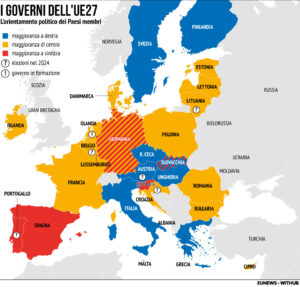Brussels – Slovakia’s much-disputed reform of the Criminal Code has passed the test of a vote in parliament and is now ready to come into effect within a month. Weeks of incessant street protests from liberal and centrist oppositions were not enough to ward off plans by the new government formed by social-democratic and far-right forces and led by Robert Fico to amend the Criminal Code and weaken the rule of law in the country. An issue of particular interest also for the entire European Union, whose institutions are studying the implications and consequences on standards of compliance with common rules and values with the new national legislation.

The green light from Slovakia’s Parliament came yesterday (Feb. 8) thanks to a solid majority secured by the three political forces supporting the Fico government – Smer-Ssd, Hlas-Sd and the Slovak National Party. The Criminal Code reform includes shortening the statute of limitations for the most serious crimes – from 20 to 5 years – and abolishing the office of the special prosecutor dealing with crimes such as those related to organized crime and high-level corruption (with cases returning to the hands of prosecutors in regional offices). According to the opposition, it is an attempt to weaken the judiciary through a ‘mafia reform package’ -which favors members of Fico’s party and high-level government supporters- in a country where the current prime minister had to resign in 2018 following the murder of the journalist, Ján Kuciak, and his girlfriend, Martina Kušnírová, who exposed links between the ‘ndrangheta and the Slovak elite (including members of his Smer party).
The President of the Republic, Zuzana Čaputová, already announced she was ready to veto the reform and, as an extreme case, challenge it before the Constitutional Court. But it is the developments in Brussels that one must watch most carefully, because this reform of the Penal Code could open a clash similar to the one in Hungary that triggered the activation of the conditionality mechanism on the rule of law. At the time of the presentation of the draft, the EU Commission, the European Public Prosecutor’s Office (EPPO), and the EU Parliament warned Bratislava that changes to the Penal Code could “seriously” compromise the level of protection of the EU’s financial interests in Slovakia, specifically in the area of corruption, fraud, and mismanagement of EU funds. In this scenario, countermeasures in Brussels would be inevitable. In the run-up to its entry into force on March 15 – with some slight modifications to meet the objections of the three EU institutions – the EU Commission will have to assess the reform as a whole and decide whether there are still concerns that warrant action, ranging from infringement proceedings to activation of the rule of law conditionality mechanism.
The Red-Black Slovakia
After last year’s September 30 elections in Slovakia, the pro-Russian Social Democracy of Smer-Ssd emerged as the leading force in Parliament, winning 22.95 percent of the votes. The Progressive Party of the vice president of the EU Parliament, second was Michal Šimečka (17.96), and Hlas-Sd (14.70) third. With only four other parties above the 5 percent threshold – the conservatives of OĽaNO, the Christian Democratic Movement, the liberals of Freedom and Solidarity, and the Euroskeptic pro-Russian right-wing Slovak National Party – it was immediately clear that Peter Pellegrini’s 27 deputies would have been decisive for the formation of any majority. There were two options: either a pro-European and pro-Ukraine coalition (in which he could also be premier) with progressives, Christian Democrats, and the Liberals, or an alliance with the two pro-Russian forces, the Social Democrats of Smer and the extreme right-wing Slovak National Party. 
Everything seemed possible until early October when Pellegrini convened a press conference to announce his support for the second option due to alleged “ideological problems” between the progressives and the Christian Democrats in a hypothetical governing majority (still stable with 82 deputies). Šimečka accused him of deciding to support Fico from the day after the elections because “stronger interests” bind them together. In contrast, Pellegrini, former prime minister between 2018 and 2020 and leader of the party founded in 2020 after the split from Smer, assured that his party would “guarantee that Slovakia’s membership in the EU and NATO will not be jeopardized.” In other words, HLAS-SD wants to guarantee continuity in foreign policy by constantly blackmailing SMER (42 MPs) and the right-wing nationalists (10) to leave the coalition. The decision to initiate a government between the social democratic left and the extreme nationalist right in the country, however, also had consequences at the European level. On October 12, the Presidency of the Party of European Socialists (PES) decided to suspend the membership of the Slovak SMER-SSD and HLAS-SD parties after the forces led by Fico and Pellegrini, respectively, chose sides: “The Memorandum of Understanding signed by the three parties is not compatible with the progressive values and principles of the European family of Socialists and Social Democrats.” Similarly, the Group of the Progressive Alliance of Socialists and Democrats in the European Parliament opted to suspend the membership of the three Slovak MEPs (Monika Beňová and Katarína Roth Neve’alová, both of the SMER-SSD and Róbert Hajšel, elected in 2019 from the ranks of Fico’s party and now an independent). The major concerns about policies that “have no place in the progressive family” are in the merits of Russia’s war against Ukraine, migration, the rule of law, and the rights of the Lgbtq+ community.

From left: Smer-Ssd leader and prime minister of Slovakia, Robert Fico, and Hlas-Sd leader and presidential candidate, Peter Pellegrini (credits: Vladimir Simicek / Afp)
At this point on the political level, all eyes are on the March 23 presidential elections. With the exit of pro-European President Čaputová, the two ruling Social Democratic parties will be banking on a common candidate, the leader of Hlas-Sd, Pellegrini, with the likely convergence of the third majority force – the far-right pro-Russian Slovak National Party – in the event of a runoff on April 6. At the moment, Pellegrini appears to be the favorite in a runoff scenario against the Progressive Party candidate, former European Affairs Minister Ivan Korčok, on whom all centrist and liberal opposition parties might decide to converge. The office of the president of the republic is mainly ceremonial in nature. However, it has some crucial powers in a period of possible erosion of standards on the rule of law: in addition to ratifying international treaties and appointing judges to the most important courts, he can, above all, veto laws passed by parliament and grant amnesty.
English version by the Translation Service of Withub






